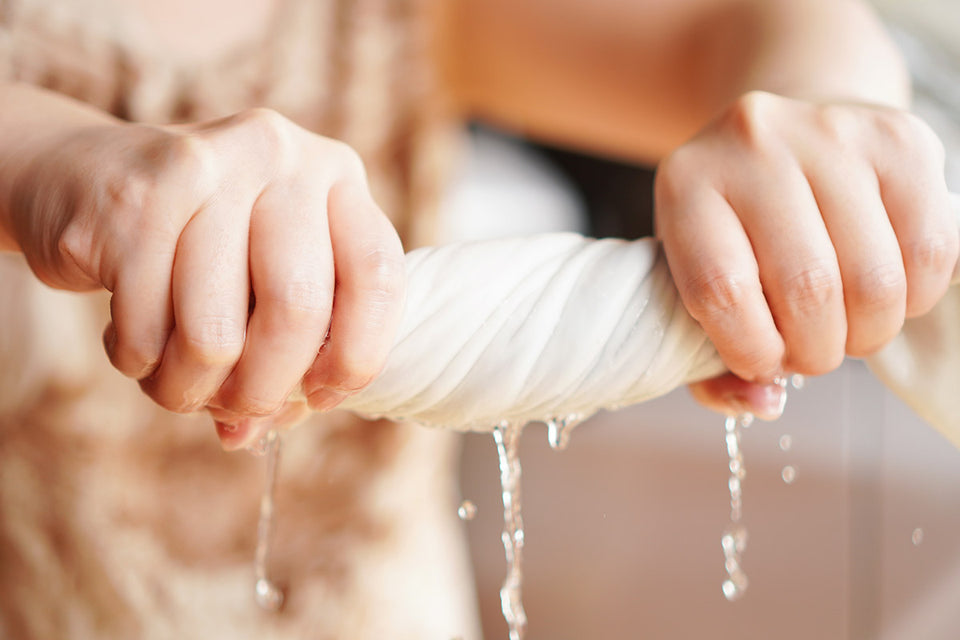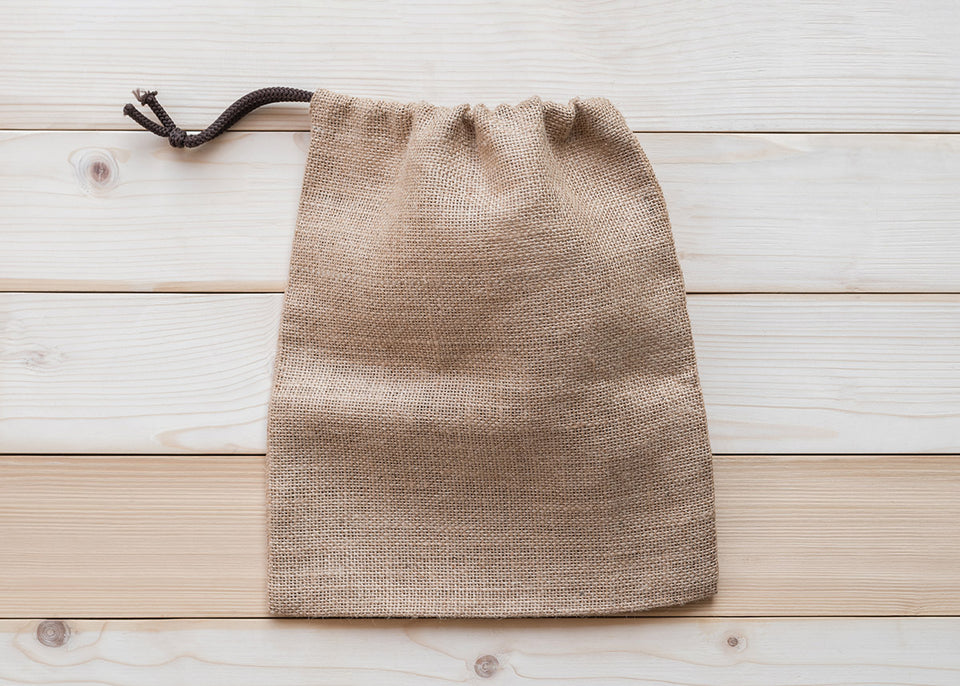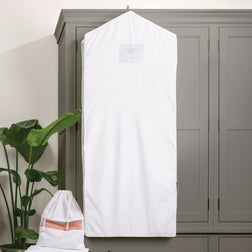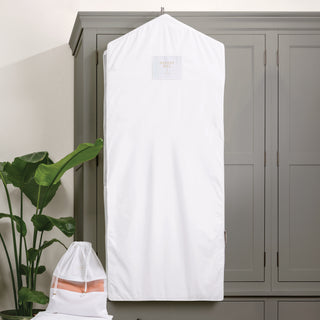When trying to extend the life of your clothes, washing them properly is very important. Deciding how to wash an item (hand wash, machine wash, dry clean) and the settings to use (water temperature, wash cycle, detergent type) all play a role in increasing the longevity of your favourite pieces.
Because of the booming fast fashion industry, clothing waste is quickly becoming a serious problem. And though there are more and more sustainable brands who are producing environmentally friendly and ethical clothing, one of the most impactful actions an individual can take is to keep their clothing longer.
Ensuring the clothes we currently own and love last longer is a simple and affordable way to shift our shopping habits and embrace sustainability.
But, helping your clothes last longer starts with how you treat each piece of clothing after you buy it. Washing, maintaining, and storing your clothes correctly extend their lifespan.
Washing Your Clothes
When trying to extend the life of your clothes, washing them properly is very important. Deciding how to wash an item (hand wash, machine wash, dry clean) and the settings to use (water temperature, wash cycle, detergent type) all play a role in increasing the longevity of your favourite pieces.
To ensure your clothing is receiving the best possible care, follow these tips to help your favourite clothes last a long time.
Properly Sort Your Clothes
Sorting your clothes prior to washing is a crucial first step to helping your clothes last longer. Good quality clothes deserve to be handled with detailed care and attention.
Start by reading the manufacturer’s care label, as different fabrics require different laundering methods. The label is where you will find all the necessary information, including the maximum temperature to use when washing the clothing item. If you have delicate garments, the label will also specify whether you should wash items in cold water, a mesh laundry bag, or special detergents containing no harsh chemicals.
And, here are a few general recommendations for washing any type of clothing:
Always separate darks from whites.
- Separate the heavy fabrics away from the light ones.
- Don’t wash very dirty clothes with less dirty ones.
- Wash towels by themselves.

Treat Stains Immediately
An important part of proper clothing care is knowing how to quickly treat stains. Losing a beloved piece of clothing due to a dried stain can be frustrating, so it may be smart to purchase a stain removal pen, which you simply dab over the area in question. This method is particularly useful for new clothes that haven't been worn often.
If the stain removal pen cannot be used on a particular item, or you don’t have a pen, rinse the stain in cold water, as it is known to effectively dissolve fabric stains. For best results, make sure you apply it quickly after the stain occurs.
Washing Delicate Garments and Sweaters
Keep delicate items safe in the washing machine by first placing them in a mesh laundry bag. Using a laundry bag or a mesh bag will protect your delicates from snagging, ripping, and friction from other clothing items.
To guarantee that your delicate items will be washed gently, hand wash them. However, if you prefer to machine wash delicates, avoid using hot water and opt for a cool wash instead.
When washing sweaters, hand wash them or machine wash them using a gentle cycle and cold water. Lay them out flat on a towel to air dry.
Avoid Dry Cleaning When Possible
The harsh chemicals used in dry cleaning do not help extend the longevity of your clothes. In fact, they can damage fabrics and fade colours. In addition, dry cleaning is rather pricey and harmful to the environment.
Instead, use spot cleaning and hand washing to keep your fragile clothing fresh and clean. Occasionally hang items in the bathroom while taking a hot shower to let them air out. Only dry clean items when absolutely necessary, or when in need of a deep clean.
Additional Washing Tips
- Before placing clothes in the washing machine, secure all drawstrings, buttons, and zippers to prevent unpleasant snags.
- Levi's CEO Chip Bergh once stated that he never washes his jeans, but if you want to wash yours, place them inside-out in the washing machine to avoid colour fading. This technique can also be used on raw denim.
- Don’t overload your washing machine. Although it may seem more cost-effective because you're washing fewer loads, your clothes won't have enough room to get thoroughly cleaned.

Maintaining Your Clothes
Maintaining your clothes with extra care and attention will also extend the lifespan of your favourite pieces.
Air Dry Your Clothes
Rather than placing your clothes in a dryer, fully or partially air dry them instead. Air drying items avoid shrinking or fading. Letting your clothes air dry also helps preserve their elasticity.
A good rule when air drying your clothes is to dry light colours outside and your dark colours inside, so they are protected from the sunlight, which might cause colours to fade.
Steaming and Repairing Your Clothes
Compared to ironing, steaming is a gentler method of removing creases from your clothing, especially your high quality clothes. If you don’t have a steamer or don’t have the time to steam, hang your clothing in the bathroom while taking a hot shower.
Instead of discarding a clothing item when it is in need of repair, contact a local seamstress or tailor to return your most treasured items to pristine condition. Doing so supports sustainability and your local community.
Use a Dye Bath
Most clothes age and lose colour over time, especially with frequent washing. Dying is one way to restore faded clothing to like-new condition.
Simply add some coloured dye to a bucket filled with the recommended amount of water. Use this technique only on solid-coloured clothing to avoid any mishaps,
Storing Your Clothes
Make your clothes last longer by learning a few simple storage tricks. Properly storing clothes will not only protect them from dust, sunlight and mould, but it will also provide you with peace of mind during seasonal storage. Storing clothes doesn't have to be a stressful event if you keep the following tips in mind.
Use Quality Hangers and Dust Bags

Avoid using plastic and wire hangers that won't adequately support your clothes in the wardrobe. In fact, plastic and wire hangers can even cause your clothing to become misshapen. Opt instead for soft or wooden hangers that handle your clothes in a much gentler and safer way.
When storing your shoes, and handbags, it is always a good idea to use dust bags. These bags will protect your accessories from dirt, moths, and dust while in storage.
Fold Heavy Sweaters
Knitwear should always be folded and stored in a drawer or cotton storage bag. Never use hangers for your heavy sweaters since their weight may cause them to stretch out of shape, rendering them useless for the next season. This rule is especially true for sweaters made from cashmere, wool, or angora.
Invest In Quality Garment Bags
Make your clothes last by investing in high-quality garment bags. These bags can also help you organise your out-of-season clothes. Choose bags made of natural fabrics like organic cotton, as they will allow your clothing to breathe while in storage.
Hayden Hill bags offer your most treasured items superior protection. While made of 100% organic cotton, they protect clothing from dust, light, moths, mould and condensation.
FAQs
How long should your clothes last?
Your clothes can last up to 15 years or even longer when properly cared for. However, if you wash your clothes too often and do not maintain them well, their life span will decrease to around three years. The longevity of a clothing item also depends on the quality of its fabric and how well you adhere to its manufacturer’s care recommendations.
Does hand washing clothes make them last longer?
Hand washing is a reasonably easy process that offers many advantages. Washing clothes by hand is less expensive than dry cleaning, which can cause fabric damage and weakening from repeated chemical cleanings. Hand washing also better maintains the integrity of coloured fabrics and is gentler on the clothes than machine washing.
Why do my clothes wear out so quickly?
Your clothes might suffer if you're the kind of person who frequently disregards clothing labels or general washing recommendations. Making your clothes last longer requires special care and attention. Using hard detergents, frequently washing your clothes, water that is too hot, choosing the wrong washing cycle, or storing them in plastic bags all decrease the longevity of your garments.
What material lasts the longest for clothes?

When it comes to fabric duration, you can never go wrong with natural fabrics, such as cotton, wool, silk, linen, and cashmere. Although synthetic fibres can increase the stability and adaptability of clothing, as a general rule, avoid purchasing clothing that contains more than 20% synthetic fibre.
Clothing made primarily of synthetic materials like rayon and polyester tend to pill, wear out quickly, and may require dry cleaning visits or other specific maintenance. Compared to synthetic fibres, natural fibres are typically softer, lighter, and far more pleasant to wear.
Taking action to make your clothing last longer is a great first step in creating a sustainable and ethical wardrobe. Slightly adjusting the way you wash, maintain, and store your clothing will dramatically increase the lifespan of your favourite and most treasured items.
The most important thing to keep in mind when creating a long-lasting wardrobe is to only buy items that you love and can see yourself wearing for many years to come. Buying pieces because they are on sale or trendy will leave you with a wardrobe full of items that don’t easily mix and match or that you will only want to wear for a couple of seasons. Identify what colours and styles look best on you, and curate a wardrobe full of those pieces.
Hayden Hill garment bags are made of 100% organic, soft cotton that is environmentally friendly and allows your favourite pieces to breathe while keeping them protected from damage. We deliver sustainable and beautiful garment care to preserve and protect the clothes you love most.









